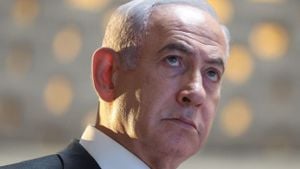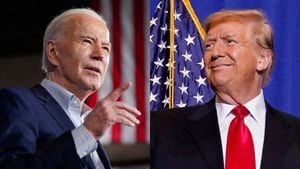The conflict between Russia and Ukraine, which began nearly two years ago, continues to shape international policy and military strategies. Recent developments highlight the dynamic nature of international responses to the war, particularly as nations evaluate their position amid shifting geopolitical landscapes.
Since the onset of the war, Ukraine has demonstrated resilience against Russian aggression, compelling nations to reassess their military and diplomatic relations. An example of this shift is evident in Ukraine's recent, controversial requests for military support from the West, including the demand for American landmines to be deployed against Russian forces. The U.S. has allowed Ukraine to use these landmines, reflecting Washington's continued support for Kyiv as it attempts to reclaim territories.
Meanwhile, European nations, historically wary of softening ties with Russia, have seen public opinion tilt sharply. Many citizens across the continent openly support Ukraine's fight against Moscow, leading to significant political pressure on their governments to provide greater levels of aid and military assistance. Germany, previously hesitant to send heavy weaponry, has committed substantial equipment to Ukraine, marking its shift from decades of restraint.
This support is not just limited to arms and munitions. Humanitarian aid has also surged, with donations pouring from both governmental and non-governmental organizations to assist the millions displaced by the war. Countries across Europe have opened borders, providing refuge to those fleeing conflict and offering asylum to students and families who have been uprooted so dramatically from their lives.
Looking beyond immediate military engagement, the global economic impact of the war has heightened concerns about energy security and supply chains. Russia's invasion has disrupted grain exports, with Ukraine referred to as the “breadbasket of Europe.” Many nations depend on this grain for their food supply, which has led to intense negotiations and efforts to secure alternative sources. The United Nations has played a pivotal role here, attempting to broker agreements to allow safe passage for Ukraine's agricultural exports.
While nations line up to support Ukraine, Russia, too, has sought to bolster its alliances. Moscow has actively engaged with countries at odds with the West, such as Iran and North Korea, seeking military supplies and economic support. The war has cast aside previous bonds, illustrating how geopolitics are reshaped by the hardships of wartime.
Despite the trials and tribulations, NATO remains resolute. The alliance has grown from initial hesitations to formulating comprehensive strategies focusing on bolstering defenses. Enhanced presence on Eastern Europe's borders serves as both protection for member states and as direct support for Ukraine, sending clear signals to Moscow about the repercussions of its actions.
What is perhaps most telling is the unwavering unity among many Western nations, which seems to be solidifying even as the war drags on. This is intriguing, considering how divisions over response strategies clashed at the onset of the conflict. Nevertheless, the Western response has gained momentum, and all signs indicate solidarity behind Ukraine as it pushes forward.
The international community's stance continues to evolve, with potential new confrontations looming. Discussions of sanctions are part of the backdrop, as countries look to limit Russia's access to financial resources and weapons. A concerted effort among allies aims to apply pressure on Moscow, with varied approaches depending on political contexts at home.
Economic ramifications are hard to ignore. The battle lines drawn through economics have left many nations grappling with inflation, energy costs, and supply shortages related to the war. Countries are striving to offset the impacts, with Central and Eastern Europe facing these challenges head-on, influencing national policies and alliances.
Trade routes are adapting, as nations aim to increase their self-sufficiency and look for new partners, reshaping the trading dynamics globally. Resilience is tested as markets fluctuate and adapt to changes brought on by the conflict. Meanwhile, humanitarian organizations rally to provide necessary assistance, creating networks of support for those affected.
After almost two years, the world watches closely. What happens next remains uncertain, but one fact is clear: the repercussions of the Russia-Ukraine war will resonate far beyond the battlefields. Nations are redefining their foreign policies, evaluating military readiness, and injecting new life—and urgency—into long-standing security discussions.
With the conflict seemingly entering a frigid winter, international forces remain ever-watchful. The cold may bring slowdowns on the battlefield, but it does little to quiet the political environment. Expect more dynamic decisions made by key players. Will Ukraine secure its aspirations for independence? Will Russia exert more influence? How nations respond will set the stage for the next chapters of this gripping saga.
Those who supported Ukraine since the beginning will need to maintain the momentum. Without it, the battle becomes infinitely tougher—a reality hinting at the potential for new strategies from both sides. The war for Ukraine's sovereignty remains at the forefront of global concerns, and many believe its outcomes will define the political alignments of the future.
Another aspect complicates matters: economic sanctions aimed at Russia, alongside on-ground military assistance to Ukraine, reflect the delicate balance Western nations walk. Supporters of Ukraine stress the importance of unwavering help, arguing it is not merely military but symbolic of freedom's fight against tyranny.
This emotional burden weighs heavily, as leaders are pressed to maintain this delicate alliance across the global stage. Summer days gave way to fall turmoil, and the onset of winter poses new lessons for policy-makers to observe, as they stand prepared to adapt to whatever challenges might appear.
Social media has also become another battleground. Each side is engaged daily, fighting for the hearts and minds of citizens beyond political borders. Information—a tool once used for education and awareness—has become weaponized amid the chaos of misinformation campaigns—and both sides are not shy about using it to their advantage.
Calls for peace negotiations resonate throughout the international community but remain fraught with skepticism. Many argue dignity and autonomy must be guaranteed, not just visions of treaties built on shaky promises. Every new development brings fresh headlines, drawing the attention of citizens globally.
Lastly, environmental factors should be considered. The war has disastrous ecological repercussions. Bombings indiscriminately destroy natural habitats and pollution from military activities disrupt multifaceted ecosystems. Responses range from immediate calls to action for environmental protections to reassessments of energy sources amid the prolonged crisis.
The ultimate question remains: how will history judge the actions taken today? Each response, each policy drafted, and every effort mobilized has potential ramifications extending beyond the Russian borders. Global capacity to respond also reflects national moral standings, raising pressing inquiries about future roles of power and alliances.
Every chess move on this war-torn board resonates globally, indicating how intertwined nations have become. International response has evolved, shedding light on empathy and solidarity, intertwining fates as the world navigates forward. The future might be hard to map, but one trend is clear: humanity's resilience against conflict remains strong.



